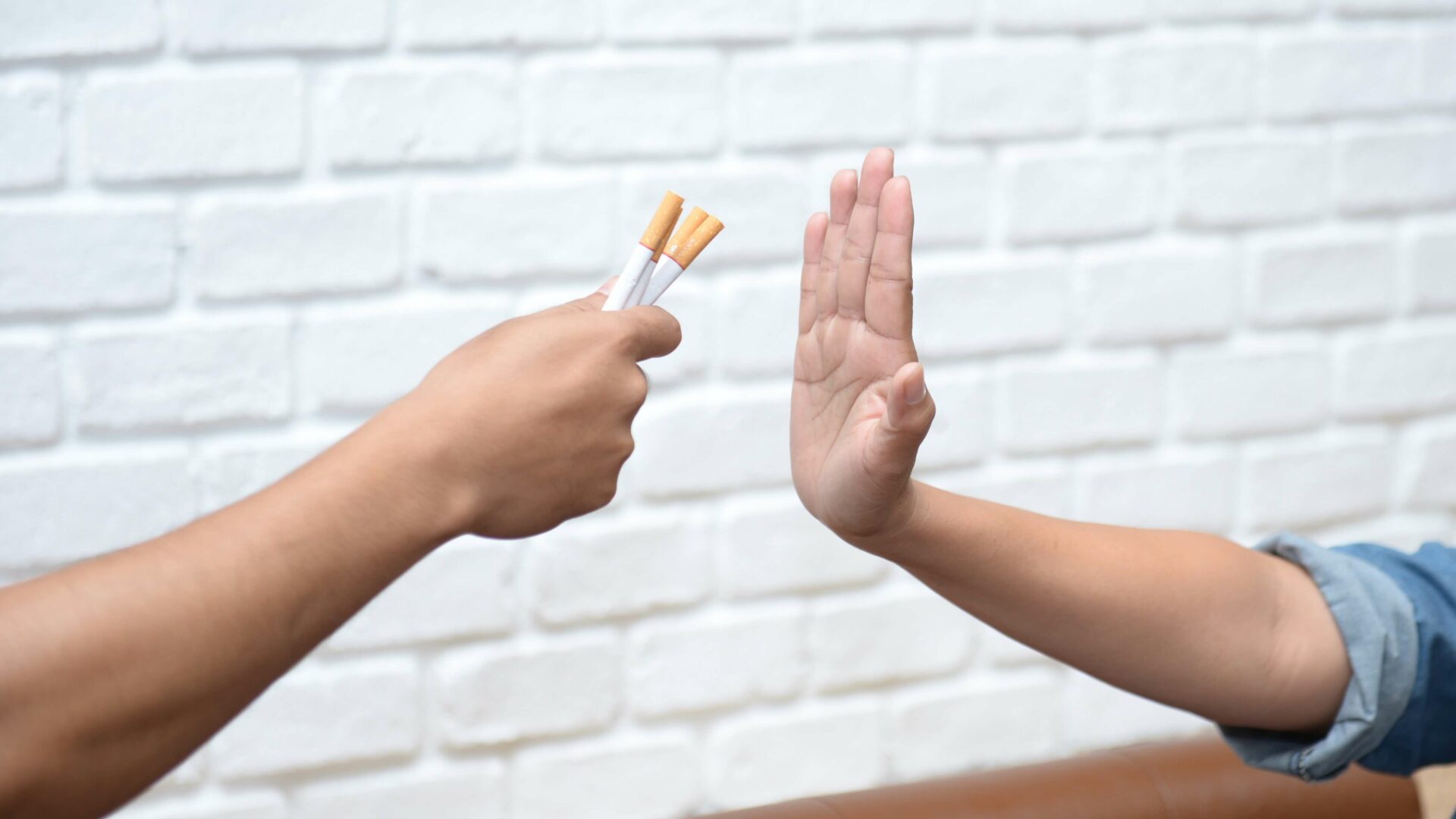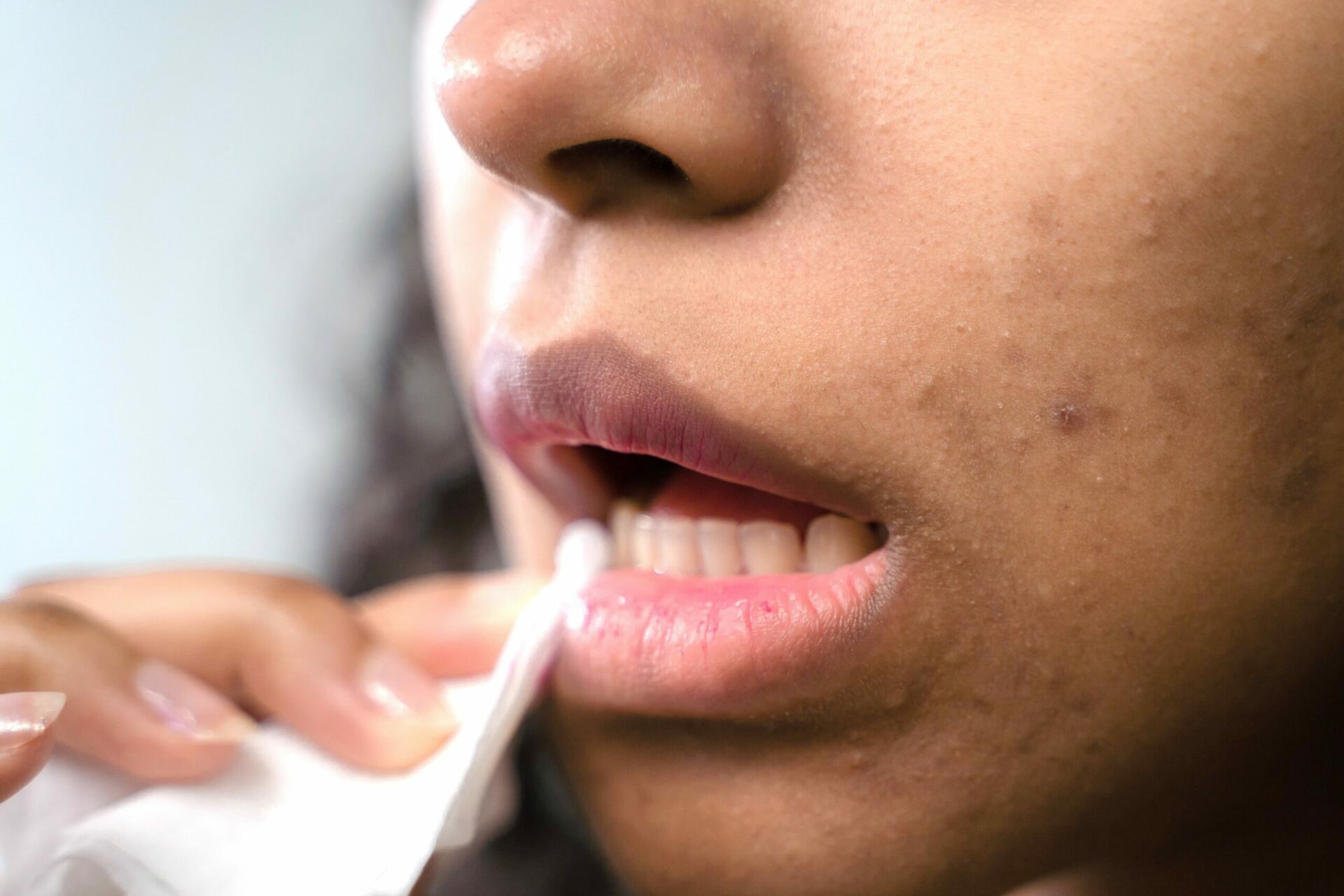It's no secret that smoking is harmful! But becoming smoke-free often turns out to be a big challenge. Learn more about the process of quitting smoking and especially about natural tools and tips that can help you on your way to becoming a non-smoker!

Your smoke-free blend!
With natural methods such as the spagyric sprays from Zimply Natural, complaints can be treated and sustainably alleviated. Put an end to old vices!
Table of contents
- Smoking quitting: a great feat of strength or just a matter of brains?
- What happens to the body and mind during smoking?
- Stop smoking and metabolism
- What actually happens when you quit smoking?
- The different phases of regeneration after quitting smoking
- Quit smoking: How do I do it?
- Home remedies to leave behind smoking
- Natural remedies and therapies that help with smoking cessation
- How Zimply Natural can support you on your way to becoming a non-smoker
- FAQ: Questions and answers about becoming smoke-free
Quitting smoking: A great feat of strength or just a matter of brains?
Many smokers know only too well the sayings "I'm really quitting tomorrow" or "This is my last one, I mean it! The intention is there, but the implementation doesn't quite work out. And this despite the fact that the disadvantages of smoking are usually obvious: Not only health suffers, but also the wallet. Even the state intervenes: Anti-smoking campaigns, frightening photos on cigarette packets, hardly any advertising for tobacco products... and yet so many people have difficulty turning their backs on smoking for good. The reason? Quite simply, smoking is not "just" an addiction, it is also a habit that is difficult and takes a lot of ambition to stop. To help you finally stop the urge to smoke, in this blog article we have summarized the best tips and herbal remedies for you that will support you on your way to becoming a non-smoker.
... approx. 40 percent the smoker develop a physical dependence?
Therefore, most smokers who are ready to quit do not experience physiological withdrawal symptoms after quitting smoking, but mainly the subjective craving, which is also called "Craving" is known. So, cognitive processes, including learning psychological conditioning and reinforcement are of great importance in smoking cessation.
What happens to the body and mind during smoking?

First, the pollutants enter your body quickly through the lungs. Then, through the blood, they spread throughout the rest of the organism, affecting almost all organs, especially the respiratory and cardiovascular systems. Numerous often life-threatening diseases are the result - including COPD, heart attacks and cancer.
The nicotine contained in cigarettes makes you crave for the next cigarette over and over again. It is addictive because it affects your reward center in the brain. Also, nicotine is a powerful cellular poison that attacks your vascular and nervous systems. In addition to nicotine, cigarettes contain other addictive substances such as flavors and aromas.
Stop smoking and metabolism
Smoking can damage the Metabolism influence in several ways. For one, nicotine increases metabolism and makes the body burn more calories. This can cause smokers to experience less weight gain than non-smokers, even if they consume the same amount of calories.
In addition, smoking can affect blood glucose and insulin levels. Nicotine can cause blood sugar levels to rise by promoting the release of glucose from the liver. This can cause the body to release more insulin to lower blood sugar. In the long term, however, this can make the body less sensitive to insulin, increasing the risk of type 2 diabetes.
Smoking can also alter the metabolism of fat cells by increasing their size and number. Smoking can cause fat cells to release more lipids, which can then be used as an energy source. However, this can also increase the risk of obesity and metabolic disorders.
Finally, smoking can also affect the metabolism of certain nutrients, including vitamin C and B-complex vitamins, which are important for metabolic health and function. Smokers often have lower levels of these vitamins in their blood than non-smokers, which can lead to metabolic problems.
What actually happens when you quit smoking?
Physical withdrawal symptoms
Physical withdrawal symptoms can begin within hours of quitting smoking and last up to a few weeks. The most common physical withdrawal symptoms include:
- Sleep disturbances or increased fatigue
- Difficulty concentrating
- Headache & Migraine
- Cough and mucus production
- Dizziness
- Appetite changes and weight gain
- Gastrointestinal problems such as constipation or diarrhea
Psychological withdrawal symptoms
Of course, the psyche also plays an important role here. Psychological withdrawal symptoms can also occur, such as:
- Intense craving for nicotine
- Anxiety and depression
- Irritability and mood swings
- Problems relaxing and concentrating

It is important to note that withdrawal symptoms can vary from person to person and also depend on how severe the nicotine addiction is. However, it is known that most withdrawal symptoms subside after a few weeks.
The different phases of regeneration after quitting smoking
- After about 20 minutes the pulse and blood pressure drops to normal values.
- According to 8 hours the carbon monoxide level in the blood is lowered and the oxygen level increases, which helps to supply organs with oxygen better.
- According to 48 hours the nerve endings begin to regenerate and the sense of taste and smell can also increasingly improve.
- According to a few weeks to months can improve lung capacity and airways, which can lead to less coughing and shortness of breath.
- Within 1 to 9 months the airways can clear and mucus is removed more quickly, which can reduce the risk of infection and inflammation.
- Within 1 year the risk of heart disease is reduced by half.
- After about 5 years the risk of cancer of the mouth, pharynx, esophagus and bladder is halved, and the risk of cervical cancer, stroke and lung cancer decreases.
- According to 10 years the risk of lung cancer has dropped by half and the risk of cancers of the mouth, pharynx, esophagus, pancreas and bladder continues to decline.
- Within 15 years the risk of heart disease is reduced to the same level as for a non-smoker.
Quit smoking: How do I do it?
Depending on how strong the nicotine addiction is and how high the motivation to quit is, there are various ways in which smoking cessation can succeed. While you are reading this blog article, the first step has already been taken! In order to be well prepared for quitting smoking, you should first inform yourself about different options and weigh up what is best for you.
With the right attitude you already have half the rent
As clear and self-evident as it sounds, the topic of motivation plays a crucial role in smoking cessation. Many people think to themselves, "I'm motivated, I really want to do it!" but then fail anyway. In other words, motivation alone is not enough. A clear Destination and a lot of discipline are also part of it. Since quitting smoking is difficult, it is advisable to set smaller goals first. This way, the road to becoming a non-smoker won't seem so long and nerve-wracking. Set small stages and reward yourself for them (not in the form of a cigarette, of course!). For example, if you have managed to give up cigarettes for three days, treat yourself to something small, such as a movie night with a portion of ice cream. After two weeks, maybe a shopping trip? After all, you've already saved enough money in that time that would otherwise have gone to nicotine consumption.
Stop smoking: Slowly, or rather apruppt?
Many people find it difficult to quit smoking from one day to the next and not relapse. Whether it is better to quit smoking slowly or immediately depends on a number of factors, and there is no single answer that is right for everyone. Some people prefer a gradual reduction in tobacco use, while others prefer to just do it right away.
Closing point methodHere you set a specific day on which you say: "Now it's over!", that is, you stop abruptly. Be careful not to set this day in the distant future, but relatively soon. During this time you will have the opportunity to continue smoking for the time being and "enjoy" it, which can make it easier for you to say goodbye to smoking. For very heavy nicotine addicts, the drastic stop might be difficult, as withdrawal symptoms are very strong in the beginning. A well thought-out strategy and tools are therefore of great importance.
- Reduction method: In the reduction method, as the name suggests, the number of cigarettes a day is gradually reduced. In the best case scenario, this will eventually make you a non-smoker. The advantage of the reduction method is very obvious: the whole ordeal is more pleasant and not quite so drastic. However, you still have to set a clear limit every day and stay consistent. The big hurdle, namely to finally draw the line, can also be difficult due to the slower withdrawal. Therefore, this method is not suitable for everyone.
Various behavioral techniques for smoking cessation

Recognition of typical behavior patterns and rituals: Identify specific everyday situations that could trigger the so-called "addiction memory". Often you don't even realize how routine smoking has become. Whether it's a cigarette after a meal, before and after work, before going to bed, on the terrace with friends... Triggers should be avoided as much as possible or perhaps alternatives should be sought, such as sucking a candy or reaching for a healthy snack.
Distraction: Engage in alternative activities that help you suppress thoughts from smoking, such as physical activity or creative hobbies.
Inaugurate family and friends: Get support from friends, family or a support group that can help you stay motivated and on track. It is helpful to talk to other people about the project. This way you make a kind of contract and your environment can support you. If you have a circle of smoker friends, it may help not to meet them at first. However, friends should always be included.
- Remove smoking utensils: Put away all smoking utensils such as ashtrays, cigarettes and lighters. If you have smoked on the balcony, you should avoid it at first.
- Stress Management: To do this, it helps to practice short relaxation and mindfulness exercises such as meditation, yoga and autogenic training to integrate into everyday life. Chewing gum or using a stress ball could also help reduce tension and the desire for a cigarette.
- Dealing with a relapse the right wayIf you do go back to cigarettes, be aware that a relapse is possible, but so is a new start.
- Get a piggy bank for the cigarette moneySaving the money you spent on cigarettes is motivating. Treating yourself to something for quitting can be a good incentive to persevere. It is best to put the money in a transparent jar so that it is clearly visible.
Nicotine replacement products for gradual withdrawal
With nicotine replacement products, the nicotine from the cigarette is replaced by the much slower release of nicotine from these preparations. The advantage is that, unlike cigarettes, they do not contain harmful substances, such as tar or carcinogens.
- Nicotine patch: Nicotine patches continuously release a certain amount of nicotine so that a sustained level of nicotine is present. As a rule, they are offered in different strengths and are particularly suitable for smokers with a moderate to strong tobacco addiction.
- Nicotine gum: Nicotine gum comes in two different strengths and are especially good for low to moderate dependence, which is when you normally smoke up to 15 cigarettes a day.
- Nicotine lozenge: When the tablet is sucked, nicotine is released over a period of 20 to 30 minutes and absorbed through the oral mucosa. It is suitable for moderate to severe tobacco dependence and relatively high, rather inconsistent daily consumption.
- Nicotine nasal spray: With nicotine nasal spray, nicotine can be delivered quickly and in a highly dosed form, as it enters the organism directly through the mucous membranes. Therefore, it is particularly suitable for smokers with a tobacco consumption of more than 30 cigarettes a day, very strong dependence or with great cravings.


Why you don't need nicotine replacement products: The gentler alternative
The downside to nicotine replacement products is that you are still feeding your body the addictive substance. To get rid of it and still have something to hold on to when the withdrawal symptoms get on your last nerve, our spray made from herbal ingredients is definitely the gentler alternative. That's because unlike other substitutes, it doesn't contain any addictive substances. Would you rather have a nasal spray with nicotine or a mouth spray with plant power? The choice is yours, so do something good for yourself and your body!
Home remedies to leave behind smoking
In fact, there are many home remedies that are well-suited to help you beat smoking. The advantage is that this is easy on the wallet and the necessary means are often only a drawer away. Common home remedies for smoking cessation are:
- Chewing gums, lozenges, lollipopsThese are normal sweets, not nicotine substitutes. However, they can still help because, for example, lollipops can be used to recreate the habitual hand movement when smoking. In general, it helps to keep the hands busy by doing this. But here, too, a little caution is called for, because too many sweets, as is well known, are not exactly conducive to good health.
- TeasA cup of tea can be very soothing in times of stress and tension and also have a positive effect on our health.
- Much water: This flushes the toxins out of the body and reduces the craving for nicotine.
- Smoking cessation apps: Just about everyone has a smartphone, and installing such gadgets only takes a few seconds. A quit smoking app can be a great support, because it mainly shows milestones that have been reached, gives further tips and even reminders with motivational sayings to keep on the ball.
... only about 3-5% of smokers who quit without aids manage to stay consistent? The rest will return to cigarettes or other nicotine-containing products sooner or later within a year. That's why aids, in whatever form, are of great importance to your success.
Natural remedies and therapies that help with smoking cessation
Acupuncture - needles instead of cigarettes
Acupuncture is a traditional Chinese healing method, which has been used for centuries to treat various types of ailments. In recent years it has been shown that acupuncture can also help with smoking cessation.
Smoking cessation usually involves the use of specific acupuncture points on the ears. These points are intended to reduce the craving for nicotine and relieve withdrawal symptoms such as anxiety, irritability and sleep disturbances. However, scientific studies on the effectiveness of acupuncture in smoking cessation have shown contradictory results. That is why it is important to note that acupuncture alone may not be sufficient to quit smoking. However, it can be useful as part of a broader smoking cessation program that may include behavior modification, nicotine replacement therapy, or medication. In addition, it is essential, speak with a qualified acupuncturist, as acupuncture can also carry risks such as infection or pain if performed by an inexperienced practitioner.
Hypnosis - a common method that proves itself
Hypnosis is a method of relaxation in which one is placed in a trance-like state to address the subconscious mind. During a hypnosis session, the hypnotist will help the smoker focus on positive thoughts and reduce cravings for nicotine. The hypnotist may also use suggestions to reduce nicotine cravings or to convince the smoker that they are a non-smoker.
Hypnosis is also designed to help motivate the smoker to quit and focus on a healthier life. Some hypnotists also offer hypnosis sessions specifically tailored to the smoker's needs to help them cope with withdrawal symptoms or stress.
However, there is no scientific evidence that hypnosis is an effective method for smoking cessation. Thus the Hypnosis is not for everyone and you may need several sessions to see a difference. It also makes sense to choose a qualified hypnotist who has experience in smoking cessation.
Globules for smoking cessation
Globules are homeopathic remedies and are used by many people to assist with smoking cessation. The idea behind this is that taking certain globules can help reduce the craving for nicotine and alleviate withdrawal symptoms.
Some of the most commonly used globules for smoking cessation are Nux vomica, Tabacum and Ignatia.
The effectiveness of globules in smoking cessation is quite controversial, as there is no scientific evidence. However, some people report positive results and recommend globules as a supplement to other methods of smoking cessation such as behavior modification, medication and therapy. In addition, it is important to speak with a qualified homeopath or physician to determine the proper dosage and remedy for your individual needs. It is also important to be aware that globules alone are not enough to successfully manage smoking cessation. A combination of different approaches can provide the best results.
Medicinal plants - The most natural way with great healing power
The use of medicinal plants for smoking cessation is an alternative therapy option based on natural ingredients. Some plants and herbs are used primarily for their detoxifying and calming properties to help smokers reduce nicotine cravings and ease withdrawal symptoms. Some medicinal plants that are particularly supportive when trying to kick the smoking habit are:
- Juniper: Helps especially when you become mentally weakened and despondent due to tobacco withdrawal. The medicinal plant is excellent for letting go of feelings that are addictive and dominate the life of the soul. In addition, juniper is clarifying, cleansing and supportive in transformation phases: So it's just the thing for smoking cessation!
- Nux vomica: Nux vomica supports you in your life change by helping with anxiety and irritability and overwhelm, thus mitigating withdrawal symptoms after quitting smoking.
- Okoubaka: Smoking has a great influence on the Metabolism and this must first recover after nicotine withdrawal. Okoubaka is particularly suitable because it stimulates the regeneration and stabilization of the intestine.
- Kava-Kava: Known as a stress reliever and basic therapeutic agent for stimulus overload, Kava-Kava has a balancing effect on mood and thus helps with psychological withdrawal symptoms when one wants to quit smoking. Overall, Kava-Kava can have an anxiety-relieving, stress-reducing, mood-lifting and relaxing effect in relation to smoking cessation.
- Goldenrod: Due to its diuretic and flushing effect, true goldenrod helps with metabolic problems that can occur due to smoking and tobacco withdrawal. So if you are afraid of gaining weight after quitting smoking and want to do something good for your metabolism in general, you should reach for the real goldenrod.
How Zimply Natural can support you on your way to becoming a non-smoker

To bring body, mind and soul back into harmony and to use the power of nature is one of our most important tasks. In doing so, we want to incorporate as gently and effectively as possible the needs of people who want to leave smoking behind for good and get the best possible result: to finally be smoke-free! Not only we believe in you, our Smoke Free Complex supports you at least as much. The best way is to take the spray every time you feel the urge for a cigarette and spray it into your mouth. In the long run, at least 3×3 sprays a day will help. In acute phases of craving, feel free to use 12×3 sprays. The medicinal plants in the Smoke-Free Complex are particularly suitable for relieving withdrawal symptoms and helping you on your way to becoming a non-smoker.
FAQ: Questions and answers about becoming smoke-free
Why is it so hard to quit smoking?
Smoking is not only an addiction, but also a habit. For these reasons, quitting is a difficult task for most people, as you have to restructure your previous life and also have many inner conflicts.
Which tools are the best?
There is no such thing as the "best" tool for quitting smoking. Rather, you should combine several tools together to create a large support network that can help you on your way to becoming a non-smoker and can catch you again and again.
How can medicinal plants support me to finally become smoke-free?
In principle, it is always a good idea to try natural alternatives first before using chemical or nicotine-containing preparations to quit smoking. After all, you want to relieve and spare your body after all the strain caused by smoking itself. For this purpose, medicinal plants are particularly suitable because of their natural ingredients and health-promoting properties.









